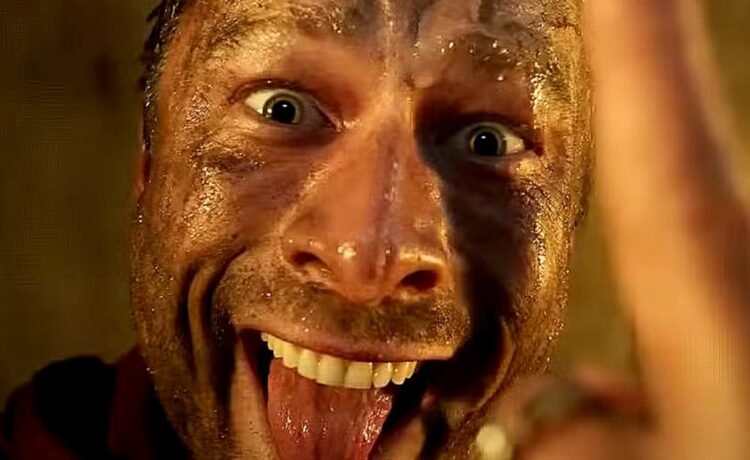
Projecting back to those halcyon days when narrative media about must-win dystopian death sports was satisfyingly scarce. It’s been a long time since Paul Michael Glaser’s 1987 film The Running Man, so we can raise a wry smile when we see its opening drag where it announces, with Nostradamus-like precision that, “By 2017, the world economy has collapsed.” The only thing that’s missing, alas, is the suffix, “again”.
This roistering, knowingly-tacky Stephen King adaptation purported that, in a hard-bitten future owned by totalitarian media conglomerates, our favourite TV show would involve watching blue collar “criminals” trying to stave off the murderous advances of a crew of spandex-clad “hunters”. With the popular notion of reality TV still very much in its cosy infancy, the initial novelty of the film was the fact that, from an ethical, moral and technical vantage, it appeared entirely inconceivable and, thus, really quite exciting.
Get more Little White Lies
One problem that a new version of the story faces before it’s even leapt from the starting blocks is that there is now zero novelty value in the idea of televised death sports, and the chilling suggestion that humanity is on the cusp of crossing a line of basic civility when it comes to live relay stuff footage is now laughably quaint.
The question of how to make a death sport movie that offers something new and exciting is answered by director and co-writer of The Running Man (2025), Edgar Wright, as: you don’t. Serve up some of the same sloppy fix-ins that can be seen in multiple iterations on every streaming channel, on every Blu-ray shelf and replayed quite regularly in a fair few cinemas and hope that this new one can beat back at least some of the contenders. Wright certainly shoots his shot, but in attempting to expand the story both thematically and in terms of the show’s modest scope, this actually feels like a smaller, more strident, less memorable film than the gaudy original.
In the role of Angry Young Man and people’s champion Ben Richards is Glen Powell, a glistening, swole Adonis plucked from the lumpen hoards who’s hoodwinked by TV super producer Dan Killian (Josh Brolin) into becoming a contender on ratings behemoth, The Running Man, so he can pay for urgent care for his poorly infant. Because Ben is a tattle-tale when it comes to institutional corruption, he’s been blackballed from every major employer out there, and so signing up to be tracked down and carved up in the name of family entertainment really is his sole recourse to earning a wage – a situation that makes him rather livid.
On that note, one vital flaw to the film is that neither Wright nor Powell seem to understand how this righteous anger should manifest inside Richards. Both seem settled on a perma-scowl with clenched teeth, v‑shaped eyebrows like a cartoon drawing, and a persistent brandishing of the middle finger, which is fine for when some jerk cuts into your lane but doesn’t work when it’s aimed at a corporate powerbroker trying to kill you for TV ratings.
With the rules of the game and the world laboriously set out, Ben is posted down a suction tube and into the arena. Back in 1987 it was a studio back-lot engineered to resemble a wasteland, now it’s the wasteland that is America. The twist here is that everyone has a potential role in the game, either as a snitch, which can earn them hard cash if the Runner is captured and killed, or as a saviour who can help out in the knowledge that the show is the root cause of so much societal rot. Wright does little to flesh out the idea of “the masses”, painting them as nascent vigilantes, peacenik hippies or uncaring middle-class bastards, and they all seem to sway obligingly to Richards’ tune.
Wright leans into an idea trialed in the original film, that of manipulated AI footage used to influence the viewership. Here, its prevalent and vindictive use speaks to the modern conundrum that it’s rarely morally virtuous types who are using this type of technology, and that, in reality, its sole application is as a tool for deception and humiliation. It’s used so often and so heavily that it eventually undercuts the idea that Richards’ on-screen struggle could ever be successful, but also begs the question that if you can create such an immaculate illusion of reality, why bother with the faff of the game at all? Deep-fake everything!
Perhaps the most disappointing aspect of the film, though, is how utterly witless it is. Wright pays homage to the maestros of subversive genre films – Paul Verhoeven, John Carpenter, Sam Raimi – but all those filmmakers possessed a sense of subtle self-awareness that seems missing in this instance. As we saw in Hitman, Powell is a fine and perceptive comic actor, but here leans into a one-note Action Man audition that becomes grating after a while. The humour in the script is mostly juvenile and flat, and whoever decided to have Michael Cera show up in a straight supporting role as a revolutionary help-meet needs their head tested.
We bring this up because Wright is a filmmaker who has constantly held on to that subversive edge, pushing a unique, left-field weirdness through the studio corridors and onto the screen to rally a vision that was decidedly his own. The Running Man feels like he’s given up the ghost and settled for something a little more broad brush, bowing down to The Man and opting to serve the flighty whims of the masses rather than indulging his own creative instincts. The brash message of the film may amount to little more than “smash the system”, but it’s a message that Wright has ignored in a film that sorely lacks for imagination and edge.






